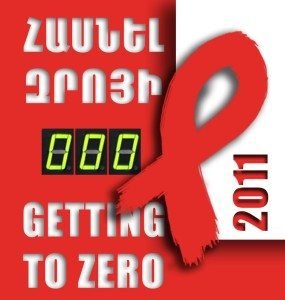YEREVAN (A.W.)—On Dec. 1, Armenia’s Advocacy Group on AIDS mobilized its resources and volunteers to hold a day of activities on World AIDS Day. Their aim was to raise awareness on the human immunodeficiency virus (HIV), which by the end of 2010 had infected an estimated 34 million people worldwide, according to UNAIDS.

Four years ago, four organizations in Armenia—Public Information and Need of Knowledge (PINK), the Women’s Resource Center, Positive People Armenian Network, and Real World Real People—began organizing joint events on HIV and AIDS awareness and, in March 2011, converged to form the Advocacy Group on AIDS, the president of PINK, Mamikon Hovsepyan, told the Armenian Weekly.
The group is active year round. They hold training sessions for journalists, organize two-day seminars with university students, prepare courses for activists, and publish informative materials on HIV and AIDS.
World AIDS Day is an evaluation of past and future efforts, and a celebration of milestones reached both by local and international organizations, said Hovsepyan. It is also a day when all available resources are directed to a mass action that reaches as many citizens as possible.
“We try to have different events every year,” said Hovsepyan. The group’s strategy is to incorporate different slogans and explore various approaches to generate interest.
The current campaign, a UNAIDS roadmap to 2015, is called “Getting to Zero.” “PINK hopes that one day the world will ‘get to zero,’ when we will have zero new HIV infections, zero discrimination, and zero AIDS-related deaths,” Hovsepyan said.
In Yerevan, activities began early in the day with several press conferences. Around 70 activists marched near university campuses and distributed over 1,000 fliers to raise awareness among students. At Aznavour Square, volunteers organized educational games they called “Learn in a Minute.” Participants also attempted to answer trivia questions and were given handmade prizes—around 1,000 bracelets, small dolls, and postcards were crafted by people living with HIV—for each question they answered correctly.
AIDS, the final stage of HIV, causes severe damage to the immune system, leaving the body vulnerable to various infections and cancers. In 2010, 148 new HIV cases were reported in Armenia. Since 1988, when the first HIV case was registered in the country, 242 people have died from AIDS, including 40 women and 5 children.
HIV is transmitted through sex (including oral sex), childbirth, breastfeeding, and contaminated needles. According to the Armenian Ministry of Health’s National Center for AIDS Prevention (NCAP), in Armenia the virus is transmitted through heterosexual practices (52 percent), drug injection (39 percent), homosexual practices (1.9 percent), mother-to-child transmission (1.6 percent), and transmission through blood (.3 percent). Over 40 percent of registered HIV cases are in Yerevan.
“People are not well informed. They still think AIDS is so far from them. There are 1,136 registered cases of HIV in Armenia and I guess most of them never thought that they could ever be infected,” said Hovsepyan. “Lack of information brings phobias and intolerance, while ignorance makes us slaves of inhumanity.”
Recently, PINK was voted HIV/AIDS Advocate of the year by activists in Armenia. It was the third year the award was given to recognize dedicated activism. Six recipients are chosen each year, including local and international organizations and representatives, government departments and officials, media entities and journalists, and public figures.
The award was especially meaningful to PINK because it was a token of appreciation prepared by individuals living with HIV. “We are thankful that our work did not stay in the shadows,” Hovsepyan said. “This work is valuable to us… Now we have additional responsibilities, and we will continue our efforts with more power and enthusiasm.”
“We believe that it is possible [to ‘get to zero’]. Maybe not tomorrow but one day,” he added.


Good to see a headline like this in the Weekly.
52% of HIV cases were transmitted were heterosexual.
Wake up and smell the coffee